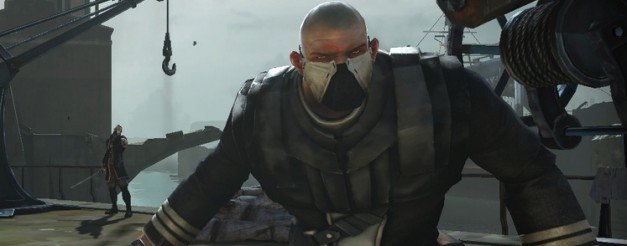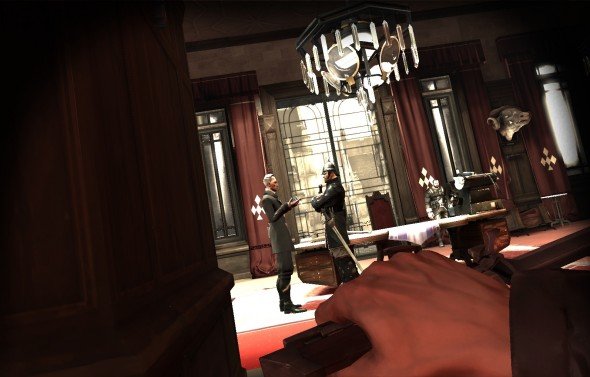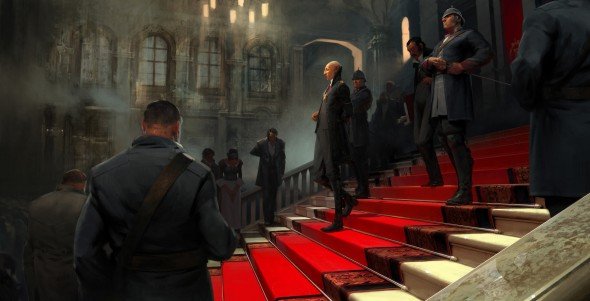
When I was invited to Dark Messiah developers Arkane to see a “secret title”, I assumed it'd be The Crossing - the game that Raphael Colantonio's company was developing with Valve in 2006, and got put officially on hold in 2009. Turns out something far more interesting is going on in Lyon. Something more in keeping with Arkane's history of immersive, single-player, first-person role-playing combat titles.
Looking at the talent behind Dishonored helps you to understand what it is. Co-created by Colantonio and Harvey Smith, the lead designer on the original Deus Ex, the art direction is courtesy of Viktor Antonov and Sebasian Mitton. Antonov was the art director for Half-Life 2, a game he describes cheerfully as his freak baby. Those European sensibilities have gone into making the location of the Kingdom, a heavily-modded retro-future industrial London that, according to Mitton, “avoids the clichés” of steampunk and Jack The Ripper.
That's what Dishonored is. A game with the options and rich complexity of Deus Ex, the varied combat and intimate melee of Dark Messiah, and the beautifully coherent Europe-centric world design of Half Life 2.
Your character - at this stage, working without a name - is a supernatural assassin, the bodyguard to the Empress. The game opens with her dying in your arms, and people completely misinterpret the whole assassin/dead-body thing, and you're wrongly accused of her murder. Your mission, according to your playing tastes, is to return the Kingdom to its former state, or to get revenge on the person who framed you.

Colantonio says that you can play through the entire game without killing anyone, although he admits it'd be a pretty hardcore playthrough. But that's not a matter of good and evil - both Smith and Colantonio flinch from binary morality. The system that replaces it is less value-laden. Killing people adds chaos to the land. In a chaotic land
How you choose to progess is up to you - like a velvet ghost or a slobbering Tasmanian Devil. However you progress, you'll be using a broad palette of abilities. “We could talk about any aspect of the game for hours,” says Smith. “But encouraging player creativity is the most important thing. We offer the player powers and systems that interact.” That's a fairly vague mission statement, but I'm shown some pretty solid examples.
It starts with a basic ability interaction - double jump, and blink. Blink is a line-of-sight instant teleportation ability - lay down a target, and you'll appear there. Double jumping gave playtesters a line of sight on platforms that weren't originally intended to be explorable, but instead of blocking them Arkane added to the game, rewarding clever use of the tactics.
The biggest gaming news, reviews and hardware deals
Keep up to date with the most important stories and the best deals, as picked by the PC Gamer team.
But there's a commitment at Arkane to make these sloppy interactions king. For example, the power of possession. Possessing people gives you access to areas that person can enter. Possessing rats gives you access to small tunnels. When Colantonio says that you can also possess fish, the natural question is... well, why? The answer: because it wouldn't make sense if you couldn't. It's a fantastic brand of logic that makes the ability to possess fish inevitable.
The most impressive combination of abilities combines four powers. The Arkane employee who's giving the demo summons a pack of rats (as plague-bearers, this power contributes to the chaos of the city). Rats move quickly, so he freezes time. Then approaches a rat, and plants a proximity-triggered razor spring trap on its back. Releasing time, he possesses the rat, and walks it around like a remote-controlled bomb.

In true Deus Ex style, objectives will have several methods of completion. In our mission to discover and deal with a corrupt lawyer, we overhear a conversation about a previous attempt to break into the building, which gives us a clue as to the whereabouts of a key. Instead, we possess a guard, taking advantage of Dishonored's curious form of possession, in which your body physically enters your host, and can pour out of it, through whatever orifice, in its new location. This will traumatise the host - the guard doubles up, vomiting, as we leave him.
We discover that the lawyer, Arnold Timsh, is turning over a tidy racket falsely certifying families as plague carriers, forfeiting their property to the authoritarian state. You can kill him, but like Colantonio said earlier, there's always another way. We're just not allowed to see what that is, in the demo.
If you want to get your weapons dirty, the up-close combat is a development of Dark Messiah's physical blend of parries, counters and brutal finishing moves. It's difficult to imagine anyone playing the game through without killing anyone when the melee combat looks so satisfying. Either your blades are extremely sharp, or heads simply aren't as comprehensively attached to their bodies in this world.
Something you'll have noticed from the screenshots - Dishonored is set in a brilliantly realised world. Antonov decribes the research that went into building this place, that's a collision of influence from different centuries, countries, and realities. “The renaissance in England didn't come through France,” he says. “It was a weird renaissance that went through Italy, Austria and Germany.”
Almost apologetically, Antonov describes this as “nerdy stuff”. But there's no need to apologise. It's nerdy stuff like this that's building a brand new world for us to mess about in, possessing fish and stabbing vomiting men.

